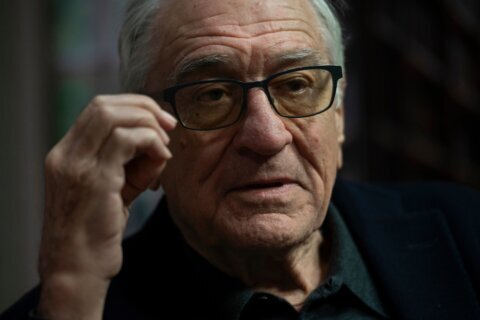Hear our full conversation on my podcast “Beyond the Fame.”
He won an Oscar playing the Soviet spy in Steven Spielberg’s “Bridge of Spies” (2015).
On Friday, Mark Rylance’s new golf comedy “The Phantom of the Open” opens in D.C., telling the true story of Maurice Flitcroft, who shot the worst round ever in British Open.
“I was a teenager in the ’70s, and though I played a little golf on my grandfather’s mowed lawns, I wasn’t reading the newspapers, so I missed Maurice,” Rylance told WTOP. “When I read the script I thought, ‘They must have made this up, this can’t be true,’ but it is true!”
Set in 1976, the film opens with Flitcroft living a blue-collar life in west England.
“It’s a part of England I’d never visited, Barrow-in-Furness on the west coast,” Rylance said. “It used to be a huge steel town as big as Pittsburgh. Now it’s where they make submarines. It’s a very working-class community on a peninsula sticking out into the sea towards Ireland, a very proud and rigorous people out there facing that west coast.”
Later in life, Flitcroft discovers a new passion when he sees golf on television, deciding to enter the British Open golf tournament as a beginner against lifelong professionals.
“He was a crane operator who was made redundant and took up golf as a hobby,” Rylance said. “He couldn’t join the clubs, so he played on beaches with tennis balls and the school playing grounds. [The British Open] was the first time he ever played on a golf course.”
While viewers may find themselves laughing as Flitcroft naively shoots a record-high score of 121, Rylance plays Flitcroft with an admirable sincerity without making fun of the man.
“You watch his interviews on YouTube [and] you think, ‘Come on, Maurice, you are making fun, you can’t seriously think that on a good day you could beat Jack Nicklaus or Arnold Palmer,’ but I’ve watched them hundreds of times and he really has this sincere belief,” Rylance said. “There’s a Don Quixote characteristic. … I just play him very sincerely.”
While Flitcroft becomes a thorn in the side of the film’s elite antagonist, British Open official Keith Mackenzie (Rhys Ifans), he becomes a folk hero to legions of adoring fans.
“No matter what the world says about him … he doesn’t buy into it,” Rylance said. “He’ll hear it, but he has marvelous replies to the press, and that’s why the public loved him so much is that he never conceded that he was a failure. He just happened to leave his four-iron in the back of the car that day. With a four-iron he’s a killer, he says!”
You’ll adore his signature catch phrase: “Practice is the key to perfection.” In Rylance’s favorite scene, Maurice shakes sand out of his shoes after practicing on the beach.
“If I have to choose once scene that survived for my career it would be the scene with a young Seve Ballesteros … in the locker room speaking Spanish together,” Rylance said. “Seve also practiced on beaches, so they both have sand in their shoes. There’s a lovely meeting between the world’s best golfer and the world’s worst, if Maurice will forgive me.”
While his wife Jean (Sally Hawkins) and twin sons Gene and James (Christian and Jonah Lees) are supportive of his late-in-life hobby, his adopted son Michael (Jake Davies) is embarrassed by his last name and even tells his business partners that they’re not related.
“I went and met the family and had many days with them,” Rylance said. “Some of the family are embarrassed by Maurice and are quite conservative and don’t like his reputation, but his sons adored him and adored his support of their [disco] dream.”
That’s right, his twin sons become disco world champions, one of the many fun twists of Simon Farnaby’s script adapted from Scott Murray’s book. Director Craig Roberts delivers humorous moments as golf balls hit spectators off screen and even hit the cameraman, as well as clever dream sequences echoing the Coen Brothers in “The Big Lebowski” (1998).
Rylance knows strong directing when he sees it, transitioning from an acclaimed stage career to winning an Oscar opposite Tom Hanks in Spielberg’s “Bridge of Spies” (2015).
“They’re just naturals,” Rylance said. “They’re just effortless — well, not effortless, of course, they put enormous work and care into it — but these two guys are naturally brilliant. … It was my good fortune to work with two geniuses and be in a place between them of humor, friendship and love. They welcomed me into that place to play with them.”
Since then, Rylance routinely shows up in Oscar contenders every year from Christopher Nolan’s war flick “Dunkirk” (2017) to Aaron Sorkin’s courtroom drama “The Trial of the Chicago 7” (2020) to Adam McKay’s apocalyptic satire “Don’t Look Up” (2021).
“The fact that I won an Oscar means that people liked that performance in that film, so I think your work … gets you into another job,” Rylance said. “I’m fortunate I don’t have to take every job I’m offered, so I take jobs that interest me. My primary interest is a good story. … Like a good sporting event, you don’t know what’s going to happen next.”
That’s the case with “The Phantom of the Open” with Flitcroft’s endless surprises, recalling the winning earnestness of the heroes in “Being There” (1979) and “Forrest Gump” (1994).
“He had incredible self belief,” Rylance said. “We all need a little of that.”

Hear our full conversation on my podcast “Beyond the Fame.”







